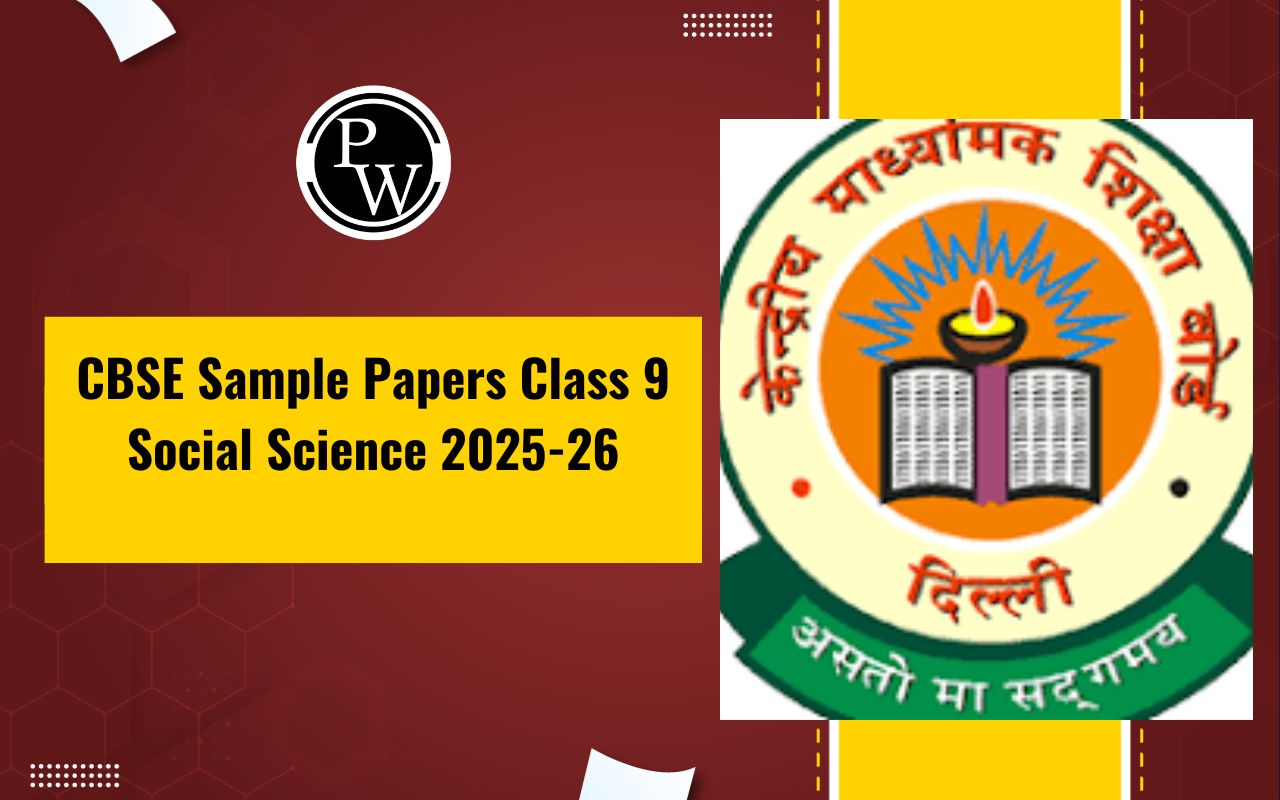
CBSE Class 9 Science Syllabus 2025-26: The Central Board of Secondary Education (CBSE) has officially released the Class 9 Science syllabus for the academic session 2025–26.
Students and teachers can now access the updated syllabus on the official CBSE website at cbse.gov.in. The syllabus includes detailed information about unit-wise topics, marks distribution, exam pattern, and internal assessment criteria. As Science is a main subject, this latest syllabus will help students plan their studies effectively and prepare for exams with a clear focus.
CBSE Class 9 Science Syllabus 2025-26
The most recent CBSE Class 9 Science Syllabus for the academic year 2025-26 is available for download by students. Check out the table below, which provides the CBSE Class 9 Science Syllabus for 2025-26.
|
Unit No. |
Unit Name |
Marks |
|
I |
Matter - Its Nature and Behaviour |
25 |
|
II |
Organization in the Living World |
22 |
|
III |
Motion, Force and Work |
27 |
|
IV |
Food; Food Production |
06 |
|
|
Total (Theory) |
80 |
|
|
Internal Assessment |
20 |
|
|
Grand Total |
100 |
CBSE Class 9 Science Syllabus Chapter Name
The tables below will provide the CBSE Class 9 Science Syllabus chapter names and topics. All these chapters of the CBSE Class 9 Science Syllabus can be found in the NCERT Solutions for Class 9 . The NCERT class 9 textbook covers the entire CBSE Class 9 Science Syllabus, making it an essential resource for students.CBSE Class 9 Science Chapter 1- Nature of Matter
The first chapter of the CBSE Class 9 Science Syllabus discusses the nature of matter. The matter is everything that has mass and occupies space—air, water, sugar, sand, hydrogen, and oxygen. The matter is made up of incredibly tiny particles. Particles of substances are drawn to one another because of the distance between them| CBSE Class 9 Chapter 1: Nature of Matter | |
| 1.1 | Elements |
| 1.2 | Compounds |
| 1.3 | Mixtures |
| 1.4 | Heterogeneous and homogenous mixtures |
| 1.5 | Colloids |
| 1.6 | Suspensions |
CBSE Class 9 Science Chapter 2- Particle Nature and Their Basic Units
The second chapter of the CBSE Class 9 Science Syllabus discusses the different Particle Nature and their basic units. We know that particles grouped in a specific way make up matter. Solids are densely packed particles that typically have no room to move about, unlike gasses, where particles are evenly separated and have unrestricted movement. The table below shows the topics included in Chapter 2: Particle Nature and their basic units| CBSE Class 9 Chapter 2: Particle Nature and Their Basic Units | |
| 2.1 | Atoms and Molecules |
| 2.2 | Law of Chemical Combination |
| 2.3 | Chemical Formula of common compounds |
| 2.4 | Atomic and molecular masses |
CBSE Class 9 Science Chapter 3- Structure of Atoms
The third chapter of the CBSE Class 9 Science Syllabus discusses the Protons, neutrons, and electrons that comprise an atom's structure. These fundamental elements provide the mass and charge of the atoms. Protons and neutrons make up the nucleus, which the electron orbits.CBSE Class 9 Books for Preparation
The table below shows the topics included in Chapter 3: Structure of Atoms| CBSE Class 9 Chapter 3: Structure of Atoms | |
| 3.1 | Electrons |
| 3.2 | Protons |
| 3.3 | Neutrons |
| 3.4 | Valency |
| 3.5 | Atomic Number |
| 3.6 | Mass Number |
| 3.7 | Isotopes |
| 3.9 | Isobars |
CBSE Class 9 Science Chapter 4- Basic Unit of Life
The fourth chapter of the CBSE Class 9 Science Syllabus discusses the basic units of life. It took billions of years for life as we know it to develop. The cell is the most fundamental component of all living things, from the first life-bearing creature to the various multicellular organisms we encounter daily. The table below shows the topics included in Chapter 4: Basic Unit of Life| CBSE Class 9 Chapter 4: Basic Unit of Life | |
| 4.1 | Cell as a basic unit of Life |
| 4.2 | Prokaryotic and eukaryotic cells |
| 4.3 | Multicellular Organisms |
| 4.4 | Cell Membrane and cell Wall |
| 4.5 | Cell organelles and cell inclusions |
| 4.6 | Chloroplast |
| 4.7 | Mitochondria |
| 4.8 | Vacuoles |
| 4.9 | Endoplasmic reticulum |
| 4.10 | Golgi apparatus |
| 4.11 | Nucleus |
| 4.12 | Chromosomes - Basic structure |
CBSE Class 9 Science Chapter 5- Tissues, Organs, Organ System, Organism
The fifth chapter of the CBSE Class 9 Science Syllabus discusses the Tissues, Organs, and Organ Systems of the human body and different organisms. A collection of cells that work together to build tissues serve a particular purpose. The table below shows the topics included in Chapter 5: Tissues, Organs, Organ System, Organism| CBSE Class 9 Chapter 5: Tissues, Organs, Organ System, Organism | |
| 5.1 | Structure and functions of animal and plant tissues |
| 5.2 | Four types of tissues in animals |
| 5.3 | Meristematic and Permanent tissues in plants |
CBSE Class 9 Science Chapter 6- Motion
The sixth chapter of the CBSE Class 9 Science Syllabus discusses motion of objects. Students learn to define the motion of objects in a straight line and to depict such motions through straightforward equations and graphs in Class 9 Science Chapter 9 Motion. Additionally, the chapter goes over many approaches to describe circular motion. The table below shows the topics included in Chapter 6: Motion| CBSE Class 9 Chapter 6: Motion | |
| 6.1 | Distance and displacement |
| 6.2 | Uniform and non-uniform motion along a straight line |
| 6.3 | Velocity |
| 6.4 | Acceleration |
| 6.5 | Distance-time and velocity-time graphs for uniform motion and uniformly accelerated motion |
| 6.6 | Elementary idea of uniform circular motion |
CBSE Class 9 Science Chapter 7- Force and Newton’s Laws
The seventh chapter of the CBSE Class 9 Science Syllabus discusses force and the various Newtons laws. An effort that modifies an object's status when it is at rest or in motion is called a force. It has the power to alter an object's motion and direction. A force can modify an object's shape as well. The table below shows the topics included in Chapter 7: Force and Newton’s laws| CBSE Class 9 Chapter 7: Force and Newton’s Laws | |
| 7.1 | Force and Motion |
| 7.2 | Newton’s Laws of Motion |
| 7.3 | Action and Reaction forces |
| 7.4 | Inertia of a body |
| 7.5 | Inertia and mass |
| 7.6 | Momentum |
| 7.7 | Force |
| 7.9 | Acceleration |
CBSE Class 9 Science Chapter 8- Gravitation
The eighth chapter of the CBSE Class 9 Science Syllabus discusses the concepts of Gravitation. The Universal Law of Gravitation and Gravitation are covered in this chapter.| CBSE Class 9 Chapter 8: Gravitation | |
| 8.1 | Gravitation |
| 8.2 | Universal Law of Gravitation |
| 8.3 | Force of Gravitation of the Earth (gravity) |
| 8.4 | Acceleration due to Gravity |
| 8.5 | Mass and Weight |
| 8.6 | Free fall |
CBSE Class 9 Science Chapter 9- Floatation
The ninth chapter of the CBSE Class 9 Science Syllabus discusses the concept of floatation, Floatation is the tendency of an object to ascend to the top levels of a fluid or to float on its surface. The tendency of an object to descend deeply into the deeper levels of the liquid is what is meant by the process of sinking, which is the exact opposite of floating. The table below shows the topics included in Chapter 9: Floatation| CBSE Class 9 Chapter 9: Floatation | |
| 9.1 | Thrust and Pressure |
| 9.2 | Archimedes’ Principle |
| 9.3 | Buoyancy |
CBSE Class 9 Science Chapter 10- Work, Energy, and Power
The tenth chapter of the CBSE Class 9 Science Syllabus discusses the concepts of effort, energy, and power which are thoroughly covered in Class 9 Chapter 11, "Work and Energy." We describe work as productive physical or mental labor, while science defines work differently. The amount of force multiplied by the distance traveled in the force's direction is the amount of work done by a force acting on an item. Work has no direction and only magnitude. The table below shows the topics included in Chapter 10: Work, Energy, and Power| CBSE Class 9 Chapter 10: Work, Energy, and Power | |
| 10.1 | Work done by a Force |
| 10.2 | Energy |
| 10.3 | Power |
| 10.4 | Kinetic and Potential Energy |
| 10.5 | Law of Conservation of energy (excluding commercial unit of Energy) |
CBSE Class 9 Science Chapter 11- Sound
The eleventh chapter of the CBSE Class 9 Science Syllabus explains that sound is a vibration that travels as a mechanical wave across a medium. A medium is a material or thing that conveys sound through it. It can be either a solid, liquid, or gas. The most typical medium for sound transmission is air. The table below shows the topics included in Chapter 11: Sound| CBSE Class 9 Chapter 11: Sound | |
| 11.1 | Nature of sound and its propagation in various media |
| 11.2 | Speed of sound |
| 11.3 | Range of hearing in humans |
| 11.4 | Ultrasound |
| 11.5 | Reflections of sound |
| 11.6 | Echo |
CBSE Class 9 Science Chapter 12- Food Production
The twelfth chapter of the CBSE Class 9 Science Syllabus that all living things require food as an energy source for cellular growth and survival. We receive sustenance from both plants and animals through agriculture and animal husbandry. Improving food quality and production is crucial to satisfy the population's growing needs. The table below shows the topics included in Chapter 12: Food Production| CBSE Class 9 Chapter 12: Food Production | |
| 12.1 | Plant and animal breeding and selection for quality improvement and managemen=t |
| 12.2 | Use of fertilizers and manures |
| 12.3 | Protection from pests and diseases |
| 12.4 | Organic Farming |
CBSE Class 9 Science Syllabus 2025-26 PDF Download
The Central Board of Secondary Education (CBSE) has released the latest Science syllabus for Class 9 for the academic session 2025–26. This syllabus outlines all the important topics, unit-wise marks distribution, exam pattern, and internal assessment details.
It serves as a valuable guide for students to plan their studies effectively and stay focused throughout the year. Students can download the CBSE Class 9 Science Syllabus 2025–26 in PDF format from the link provided below and start their preparation with the latest curriculum.
Do you need help with your homework or preparing for exams?
Study without using the internet
Preparation Tips for CBSE Class 9 Science
1. Understand the Syllabus Thoroughly: Start by going through the latest CBSE syllabus. Know the unit-wise weightage so you can focus on high-mark chapters like Motion, Force and Work and Matter - Its Nature and Behaviour.
2. Stick to NCERT Textbook: Your NCERT Science book is the most important resource. Read it line by line, as most questions in the exam are directly based on NCERT content.
3. Make Short Notes: Create chapter-wise summary notes and concept maps. Highlight important formulas, definitions, and diagrams for quick revision.
4. Practice Numerical Problems: Solve as many numerical-based questions from chapters like Motion, Force, and Work. Practice formulas and units regularly.
5. Focus on Diagrams: Science diagrams like cell structure, laboratory setups, or motion graphs are often asked. Practice drawing and labeling them neatly.
6. Solve Previous Year Papers & Sample Papers: This helps you get familiar with the exam pattern and improves your speed and accuracy. Aim to solve at least one paper every week.
7. Revise Regularly: Set aside time for weekly revisions. Go over important topics and clear any doubts immediately to avoid last-minute stress.
8. Don’t Ignore Internal Assessment: Practical experiments, activities, and periodic tests form 20% of your marks. Take them seriously to secure full marks.
CBSE Class 9 Science Syllabus FAQs
How many units are there in the CBSE Class 9 Science Syllabus for 2025-26?
Is science in ninth grade challenging?
How do I get a 95 in class nine?
Is internal assessment compulsory in Class 9 Science?













